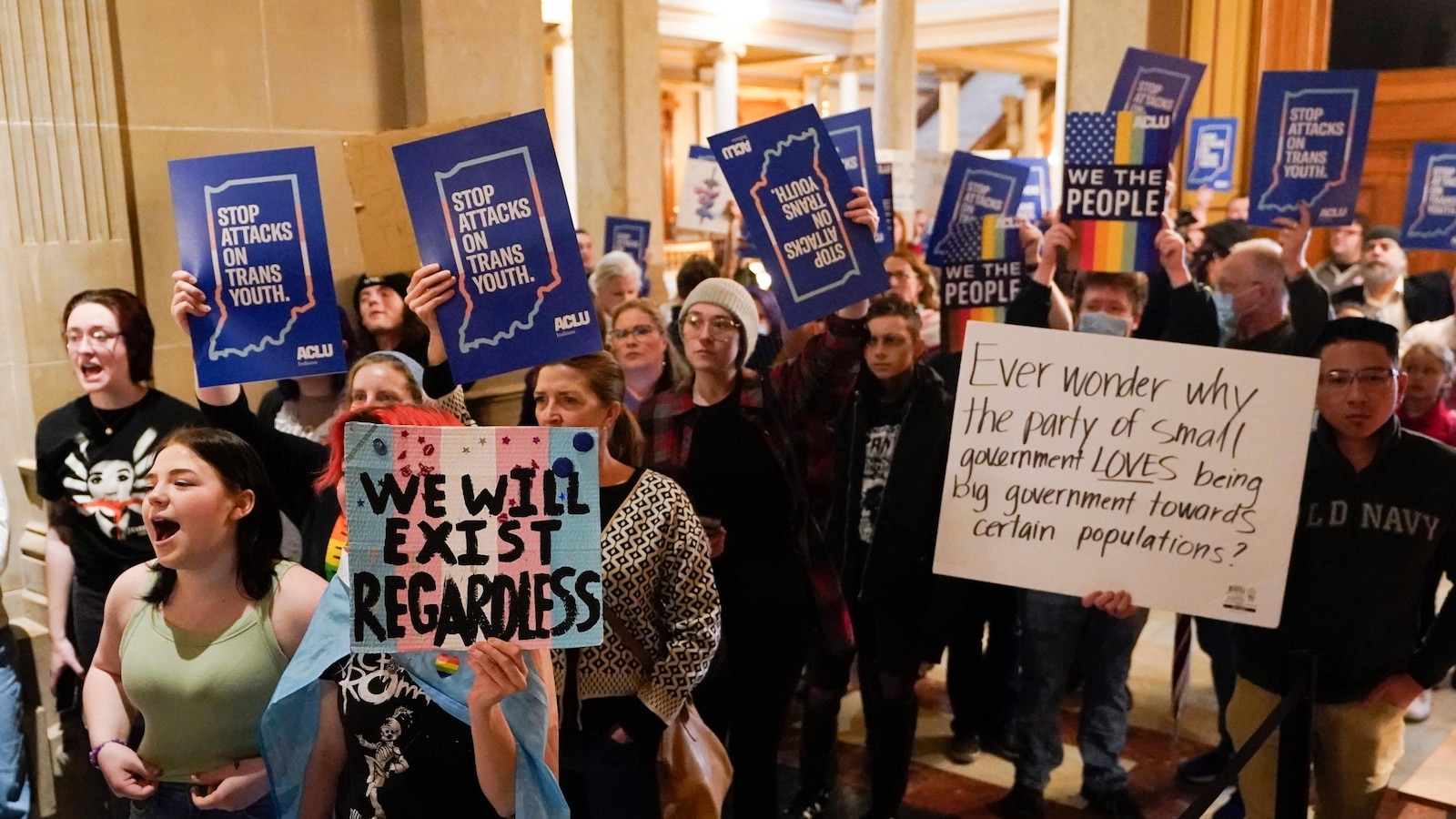
INDIANAPOLIS — A federal appeals court on Tuesday allowed Indiana’s ban on gender-affirming care to go into effect, removing a temporary injunction a judge issued last year.
The ruling was handed down by a panel of justices on the 7th Circuit Court of Appeals in Chicago. It marked the latest decision in a legal challenge the American Civil Liberties Union of Indiana filed against the ban, enacted last spring amid a national push by GOP-led legislatures to curb LGBTQ+ rights.
The law was slated to go into effect on July 1, 2023. But the month before, U.S. District Court Judge James Patrick Hanlon issued an injunction preventing most of it from taking effect. Hanlon blocked the state from prohibiting minors’ access to hormone therapies and puberty blockers, but allowed the law’s prohibition on gender-affirming surgeries to take effect.
Hanlon’s order also blocked provisions that would prohibit Indiana doctors from communicating with out-of-state doctors about gender-affirming care for their patients younger than 18.
In a written statement Tuesday, the ACLU of Indiana called the appeals court’s ruling “heartbreaking” for transgender youth, their doctors and families.
“As we and our clients consider our next steps, we want all the transgender youth of Indiana to know this fight is far from over,” the statement read. “We will continue to challenge this law until it is permanently defeated and Indiana is made a safer place to raise every family.”
The three-judge panel that issued Tuesday’s order comprises two justices appointed by Republican presidents and one by a Democrat. The late Republican President Ronald Reagan appointed Kenneth F. Ripple; former Republican President Donald Trump appointed Michael B. Brennan; and current Democratic President Joe Biden appointed Candace Jackson-Akiwumi.
The ACLU of Indiana brought the lawsuit on behalf of four youths undergoing gender-affirming treatments and an Indiana doctor who provides such care. The lawsuit argued the ban would violate the U.S. Constitution’s equal protection guarantees and trampled upon the rights of parents to decide medical treatment for their children.
Every major medical group, including the American Academy of Pediatrics and the American Medical Association, has opposed the restrictions enacted by at least 23 states and has said that gender-affirming care for minors is safe if administered properly.
Representatives from Indiana University Health Riley Children’s Hospital, the state’s sole hospital-based gender health program, told legislators earlier last year that doctors don’t perform or provide referrals for genital surgeries for minors. IU Health was not involved in the ACLU’s lawsuit.
Indiana Attorney General Todd Rokita called the state law “commonsense” in a post on X, formally known as Twitter, Tuesday evening.
Most of the bans on gender-affirming care for minors that have been enacted across the U.S. have been challenged with lawsuits. A federal judge struck down Arkansas’ ban as unconstitutional. Judges’ orders are in place temporarily blocking enforcement of the bans in Idaho and Montana.
The states that have enacted laws restricting or banning gender-affirming medical care for transgender minors are: Alabama, Arkansas, Arizona, Florida, Georgia, Idaho, Indiana, Iowa, Kentucky, Louisiana, Mississippi, Missouri, Montana, Nebraska, North Carolina, North Dakota, Ohio, Oklahoma, South Dakota, Tennessee, Texas, Utah and West Virginia.
Indiana recently passed a controversial law that allows healthcare providers to refuse gender-affirming care to minors based on their religious or moral beliefs. This law has sparked intense debate and raised concerns about the well-being of transgender youth in the state.
Gender-affirming care, also known as gender transition care, is a crucial form of treatment for transgender individuals. It can include hormone therapy, puberty blockers, and gender confirmation surgery, all of which are designed to help individuals align their physical characteristics with their gender identity. For many transgender youth, access to these treatments can be life-saving and essential for their mental health and well-being.
However, the new law in Indiana allows healthcare providers to deny these services to minors if they have objections based on their religious or moral beliefs. This means that transgender youth in the state may face significant barriers to accessing the care they need to live authentically and comfortably in their own bodies.
Critics of the law argue that it is discriminatory and harmful to transgender youth. They point out that denying gender-affirming care to minors can have serious consequences, including increased rates of depression, anxiety, and suicide among transgender individuals. By restricting access to these treatments, the law puts the health and well-being of transgender youth at risk.
Supporters of the law, on the other hand, argue that healthcare providers should have the right to refuse treatments that go against their beliefs. They believe that allowing healthcare providers to opt out of providing gender-affirming care to minors is a matter of religious freedom and individual conscience.
Regardless of where one stands on this issue, it is clear that the new law in Indiana has significant implications for transgender youth in the state. It raises important questions about the rights of healthcare providers, the well-being of transgender individuals, and the role of government in regulating access to healthcare.
As the debate continues to unfold, it is crucial for policymakers, healthcare providers, and advocates to consider the needs and rights of transgender youth in Indiana. Ensuring access to gender-affirming care for all individuals, regardless of their gender identity, is essential for promoting equality, dignity, and well-being for all members of society.


